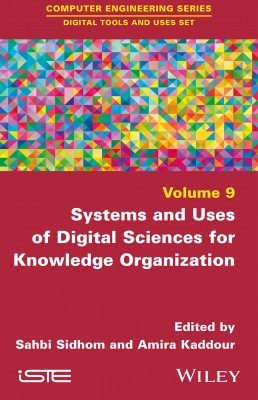
Systems and Uses of Digital Sciences for Knowledge Organization is a large-scale scientific work that brings together researchers and R&D professionals to discuss ideas and actions in the organization of knowledge. The main objective of this book is to define collaborative strategies, use advanced technologies in multiple research fields and outline applications of knowledge organization and its cultural, education, economic and industrial potential.
The organization of knowledge and advanced technologies (OCTA) asks the following questions: How can we strengthen alliances between multi-disciplinary and trans-disciplinary studies? How can we broaden our skills surrounding common objects of study? How can we innovate the solutions found and propose sustainable development to society confidently?
This book is a result of intensive and collaborative work between highly respected scientific authors. The nine chapters that have been selected for this book have been peer-reviewed by the OCTA program committee, both as written submissions and when presented during the OCTA multi-conference on organization.
1. Multi-Agent System and Ontology to Manage Ideas and Represent Knowledge: Creativity Challenge by Pedro Chavez Barrios, Davy Monticolo and Sahbi Sidhom.
2. Comparative Study of Educational Process Construction Supported by an Intelligent Tutoring System by Walid Bayounes, Inès Bayoudh Saadi and Hénda Ben Ghézala.
3. Multi-Criteria Decision-Making Recommender System Based on Users' Reviews by Mariem Briki, Sabrine Abdrabbah and Nahla Ben Amor.
4. Spammer Detection Relying on Reviewer Behavior Features Under Uncertainty by Malika Ben Khalifa, Zied Elouedi and Eric Lefèvre.
5. Social Networking Application, Connections Between Visual Communication Systems and Personal Information on the Web by Marilou Kordahi.
6. A New Approach of Texts and Writing Normalization for Arabic Knowledge Organization by Hammou Fadili.
7. Ebola Epidemic in the Congo 2018-2019: How Does Twitter Permit the Monitoring of Rumors? By Marc Tanti.
8. From Human and Social Indexing to Automatic Indexing in the Era of Big Data and Open Data by Nabil Khemiri and Sahbi Sidhom.
9. Strategies for the Sustainable Use of Digital Technology by the AWI in the Management of Knowledge and Cultural Communication on the "Arab World" by Asma Abbassi.
Sahbi Sidhom is Full Professor at the University of Lorraine, France, and Senior Researcher affiliated with the Lorraine Research Laboratory in Computer Science and its Applications, a research unit that is shared by CNRS, the University of Lorraine and INRIA Grand-Est. His research focuses on knowledge organization, information processing with NLP and data mining and web intelligence systems.
Amira Kaddour is.Professor at the University of Carthage, Tunisia, and is the Chair of the Professional Master’s degree on “Innovation Engineering and Technology Transfer” at ENSTAB Engineering School. Her research focuses on financial risk management, economy and financial modeling and data financial intelligence.